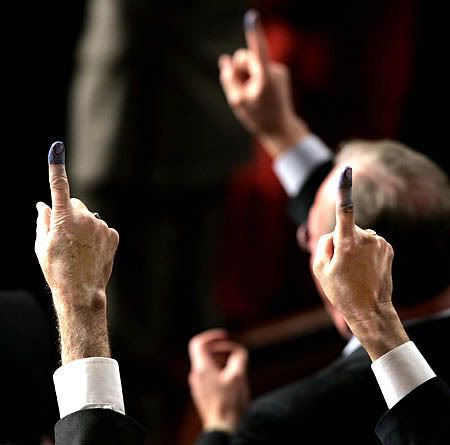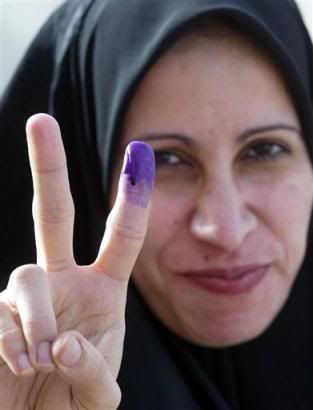As Reuters reported yesterday,
The top-ranking Republican in the U.S. Senate on Sunday expressed frustration with the Iraqi government, saying Republicans were "overwhelmingly disappointed" with the lack of political progress.
"The Iraqi government is a huge disappointment," Senate Minority Leader Mitch McConnell told CNN'S Late Edition on Sunday.
"So far, they've not been able do anything they promised on the political side," the Kentucky Republican said, citing the Iraqis' failure to pass a new oil revenue bill, hold local elections and dismantle the former Baath Party of Saddam Hussein. "It's a growing frustration."
"Republicans overwhelmingly feel disappointed about the Iraqi government," he added.
It's a far cry from the sentiment expressed at Bush's 2005 State of the Union address, given just weeks after Iraq's much-heralded national elections. At that that State of the Union, Republican lawmakers dyed their fingers purple in a gesture meant to convey their solidarity with the people of Iraq and its newly elected government.

The purple fingers were a reference to a technique used in the Iraqi elections to protect against voter fraud. After casting their ballots, Iraqis had their fingers dipped in purple dye, in order to prevent multiple voting. The practice produced many media-friendly images which were broadcast widely on U.S. television in a self-congratulatory atmosphere, with pundits endlessly marvelling at how proud Americans should be for bringing democracy to the long-oppressed Iraqi people. One of the most iconic of these images was of a young Iraqi woman giving the "victory" sign with her purple-stained finger:

This image became a symbol of the hope that the U.S. had brought the people of Iraq, particularly the women.
But even at the time, most commentators seemed to miss the significance of the elections, which astute observers noted actually pointed to the desire of the Iraqi people for U.S. and coalition forces to leave their country. As Matthew Rothschild wrote in The Progressive,
Despite President Bush's trumpeting of the elections as a symbol of support for the U.S. efforts, many Iraqi voters, like [Khalid] Kareem, cast their ballots to boot out the Americans. Even in Fallujah, a city that is one of the most potent symbols of resistance to the occupation and the new government, local leaders and resistance groups risked assassination by jihadis by encouraging their followers to vote and avoid attacking polling stations. In some cases, these leaders even called upon their people to protect polling stations from Al Qaeda operatives, who threatened death for anyone participating in the political process.
Rothschild quoted Moayed Jassim Abed, a truck driver from Ramadi, who seemed to reflect the sentiments of many Iraqi voters, that their primary concern in electing their government was the ongoing problem of security. "We want security and stability," Abed said. "The Americans have been there three years and they have done worse than Saddam has done."
By participating in the electoral process and electing a national government, Abed, like so many other Iraqis, hoped that he would be hastening the day that the Americans would leave.
Beyond anecdotal evidence, Rothschild also cited a nationwide poll conducted just before the election:
A recent Oxford Research Associates poll conducted for a number of Western media organizations found two-thirds of Iraqis oppose the presence of U.S. troops in their country. In the same poll, "occupation forces" came last behind religious leaders, police, the United Nations, the new Iraqi army, and political parties when Iraqis were asked, "How much confidence do you have in ...?" A survey conducted by Iraqi pollster Saadoun Al-Dulaimi (now the minister of defense) ahead of the January 2005 elections found that 85 percent of Iraqis wanted withdrawal "as soon as possible."
A secret poll taken by the British Ministry of Defense less than a year later found an even greater majority of Iraqis opposing the presence of foreign troops in their country. The poll, reported the conservative British Telegraph, found that 82% of Iraqis opposed the occupation and that up to 65% of Iraqis supported attacks on occupation forces. Fewer than one percent thought that U.S. and British military involvement was helping to improve security in their country.
Now, two years later, with the security situation in Iraq worse than ever, it appears that the Iraqi parliament is finally coming to express the popular will of the Iraqi people. As the Washington Post reported last week,
A majority of members of Iraq's parliament have signed a draft bill that would require a timetable for the withdrawal of U.S. soldiers from Iraq and freeze current troop levels. The development was a sign of a growing division between Iraq's legislators and prime minister that mirrors the widening gulf between the Bush administration and its critics in Congress.
The draft bill proposes a timeline for a gradual departure, much like what some U.S. Democratic lawmakers have demanded, and would require the Iraqi government to secure parliament's approval before any further extensions of the U.N. mandate for foreign troops in Iraq, which expires at the end of 2007.
For his part, Mitch McConnell said that if the Iraqi legislation passes, the U.S. would be happy to leave the country. "I want to assure you, if they vote to ask us to leave, we'll be glad to comply with their request," he said.
If so, it may mark the first time that Republicans actually respect the popular wishes of the people being occupied by U.S. forces, or for that matter, the American people, who also support ending the occupation as soon as possible. These wishes have been expressed both in public opinion polls, and at the voting booth. As Foreign Policy in Focus (FPIF) noted last week,
The congressional vote reflected public opinion about the war. Before the [November 2006 congressional] election, the Iraq war was a top priority for 61% of Democrats and 52% of Independents, compared to 38% of Republicans. Democratic Party leaders in both the House and the Senate have explained their effort to pass legislation to withdraw U.S. troops from Iraq as keeping faith with the voters in the November 2006 congressional elections, which brought Democrats to power. As Speaker of the House Nancy Pelosi (D-CA) put it, “Last fall, the American people voted for a new direction in Iraq.”
Public opinion has become even more opposed to the war since the November elections. A recent New York Times-CBS News poll found 64% of Americans supported a timeline for withdrawal in 2008. A CNN poll shows that 54% of American opposed the Bush veto of the deadline for withdrawal bill. In February 2007, the Vermont state legislature became the first in the union to support resolutions calling for immediate withdrawal of U.S. forces from Iraq. Other states may follow as they see the congressional initiative stall.
If other states begin to follow suit as FPIF predicts, and if the anti-occupation legislation passes in the Iraqi parliament, it could be interesting to watch just how stubborn George Bush and his allies in Congress remain in continuing this unpopular war. With the vast majority of the world, as well as the Iraqi and American people, opposed to the war, the Republican rationales for continuing it are increasingly difficult to justify.
Indeed, if by dipping their fingers in purple ink they meant to indicate their support for democracy -- either in Iraq or at home -- they would be working to end this war as soon as humanly possible.

3 comments:
"..vast majority of the world, as well as the Iraqi and American people, opposed to the war..."
Hyperbole in summation is either intellectual laziness or deliberate misdirection. Which is it?
Actually, I would say that calling an accurate statement "hyperbole" is either intellectual laziness or deliberate misdirection.
I suppose I could have couched my language in more cautious word choices such as this testimony before the House Committee on Foreign Affairs:
"In a recent 14-country poll that we did with the Chicago Council, large majorities in 12 of them said that 'the US is playing the role of world policeman more than it should be.' ... 75% disapprove of the how the US is handing the Iraq war ..."
-- http://www.worldpublicopinion.org/pipa/articles/views_on_countriesregions_bt/326.php?nid=&id=&pnt=326&lb=btvoc
But, honestly, I think my choice of words conveys the reality in a more accurate way. Call it misdirection if you like, but the truth is the vast majority of the world DOES oppose this war. Maybe you should take a trip abroad every once in a while.
Wow.
Thoughtful
stuff... Found this here on consortiumblog.blogspot.com [url=http://easyrvoutdoors.com]RV[/url]
Post a Comment